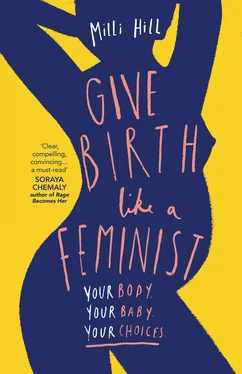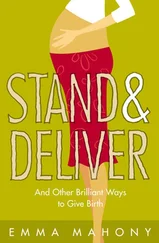Similarly, the cutting of the umbilical cord has become almost symbolic of power and ownership in the birth room. Midwife Amanda Burleigh has campaigned for fifteen years for ‘optimal cord clamping’, sometimes called ‘delayed cord clamping’.
‘We know that there is plenty of evidence to support the health benefits of delayed clamping and it has been a NICE guideline since 2014,’ she told me. ‘However, in spite of myself and a number of others campaigning for clinicians to wait just a few minutes, some are still cutting the cord immediately which is not recommended and research shows can cause harm.’
Indeed, in a survey by the Positive Birth Movement[35] of parents whose babies were born in the UK between 2015 and 2017, nearly a third stated that their baby’s cord was cut less than a minute after the birth, with one in five stating the cord was cut immediately. Arguably, cutting the cord too early with no clinical reason could be described as an act of obstetric violence, and yet it clearly continues to happen in UK birth rooms and globally – why? Some say it’s just because change takes a while and ‘that’s the way it’s always been done’, others suggest that in a time-pressed world, it can be difficult to pause. I wonder. Could it be there is something about the moment of birth that is so powerful, that somehow there is an unconscious need to lay claim to the cutting of the cord and holding of the baby (perhaps the ultimate ‘prize’)? It is certainly very interesting to look at the behaviour of birth attendants in the first hour of life, and notice just how much disturbance can take place to the mother–baby bond and interaction.
It seems as if the moment the baby arrives the focus on the mother is lost. It becomes about the staff’s interactions with the baby. The doctor who insisted on delivering my baby cut the cord, announced the gender and held her aloft like a hunting trophy. She illustrated her take on who was relevant in the room and who wasn’t. My husband and I did not feature, let alone the baby.
Hannah Carter, UK
A poignant ventouse delivery – it’s a mum I saw in infertility clinic at the very start of this job. I feel like holding the baby aloft like Simba and blasting out my best ‘Circle of Life’.
Adam Kay, This is Going to Hurt [36]
I have called the first hour after the birth the ‘Hour of Power’. I call it this for two reasons: partly because it’s a time when, ideally, a woman should be feeling pretty triumphant, and partly because it’s a ‘supercharged’ time in which a new human begins their first experiences of the world, and a woman and family meet that human for the first time. It’s magical, and, just like birth, we should be thinking about what we can put in place to make this time special and memorable for everyone involved, and what our plan B is if this doesn’t work out.[fn4] Ideally, the time should be calm and undisturbed – as pioneering obstetrician Michel Odent puts it, ‘don’t wake the mother’.[37] During this time a complex set of hormonal and biological processes take place that affect bonding, lactation, the colonisation of the baby’s skin and gut flora, and the baby’s adaptation to the world of breathing, gravity and thermo-regulation, to name just a few. Of primary importance is the hormonal dance during which the mother falls in love with her newborn; if left to their own devices, this will take place with mother and baby in skin-to-skin contact, quietly meeting one another’s gaze. It’s very unusual to see this unique time unfold naturally without interruption, however, and not just in Western culture, but globally – where everything from a belief that colostrum is bewitched to bathing, eye drops, suctioning the nose, swaddling or ear-piercing disrupt the golden time between parent and child.
The Hour of Power is not always experienced as empowering. In the time immediately following the birth, women most often readily accept that professionals have important checks to do that must take precedence over what is often an overwhelming and even physically felt need to hold their babies. The question ‘Can I hold her now?’ can be heard in birth rooms globally, as the mother seeks permission to have her newborn returned to her. Odent has an interesting theory about why, with our early clamping, washing, wiping, weighing, and bewitched colostrum, nobody can seem to leave mothers and babies in peace. The disruption of bonding has an evolutionary advantage, he argues, creating tougher humans and better warriors: ‘The greater the social need for aggression and an ability to destroy life, the more intrusive the rituals and beliefs are in the period surrounding birth.’[38] Whether or not Odent is right, it’s certainly true that Westerners value ‘independence’ in their children, and that the link between parenting and personality is well established. In disrupting the Hour of Power, our cultural values – that efficiency and tick boxes matter more than relationships and connection – are certainly being upheld. Furthermore, if Odent is right, we’re upholding the patriarchy, too, laying the foundations for a new generation of aggressors and destroyers, who will in their turn cut, clamp, separate and generally disrupt the oxytocic peace. Whichever way you look at it, Odent sums it up well when he says, ‘reconsidering our attitudes during this short period of time shakes the very foundations of our cultures’.
Love from a distance: life in the NICU
The early attachment of woman and baby is also low on the list of priorities when a baby is born prematurely. Common practice is for the baby to be taken to a special unit and placed in an incubator, with only a few pioneering neonatal units in the world doing things differently. In Uppsala, Sweden, Dr Uwe Ewald and colleagues encourage ‘kangaroo care’,[39] whereby the separation of the baby from their parent is kept to a minimum. His state-of-the-art unit places babies in skin-to-skin contact on the chests of their carers, out of the incubator and in bed or often in slings, with mobile monitors in the parent’s pocket. However, in Dr Ewald’s experience, parents will often detect issues several seconds ahead of the monitor. Ewald’s work is inspired by a focus on the rights of the child not to be separated from their parents, an understanding of early infant attachment – ‘Bonding is a bit more than just holding a finger,’ he points out – and an empathy for the experience of both the baby and the parents and the anguish of separation they may be feeling.
Dr Ewald’s way of thinking is highly unusual, however, and the majority of parents whose babies are in the NICU will be apart from them and will often feel the need to ask, ‘Am I allowed?’ ‘At the start we didn’t realise that we were actually able to touch her,’ said one mother. ‘Nobody told us we were allowed and we thought it was just the nurses who could. We didn’t hold her either because we didn’t realise we could.’ ‘I did not feel like she belonged to me,’ said another NICU mother, while another commented, ‘I felt like I was cluttering the place up because I hung out there so much.’[40]
Donna Booth, who founded the New Zealand organisation NUMB (Neonatal Unity for Mothers and Babies) after her own experience, told me of how the imbalanced power dynamic of the NICU made her feel assaulted. ‘My baby was born by caesarean and I had a general anaesthetic that I did not want. This was the first assault. The second assault happened when I was in recovery and NICU staff kept sending messages insisting on having my child’s name given to them to write in the notes and on the incubator – but I wanted to be the one to name this child when I recovered. The third assault was when I finally got to the NICU in a wheelchair and the nurse (probably thinking she was being welcoming and helpful) introduced me to my baby, taking the hat off the baby and telling me the hair colour and remarking on the fingers and toes. I wanted with all of my heart and soul to be the one to discover these things myself, to reclaim this time, to marvel in the gorgeousness of my perfect child; but she stole that from me. There were further assaults. Mothers like me who want to be with their babies are a challenge for the NICU. “Parents can visit any time” does not mean you can stay for twenty-four hours a day without some sort of resistance, punishment or even being positioned as somehow not right in the head.’
Читать дальше












